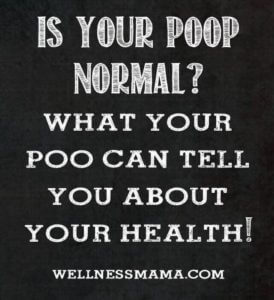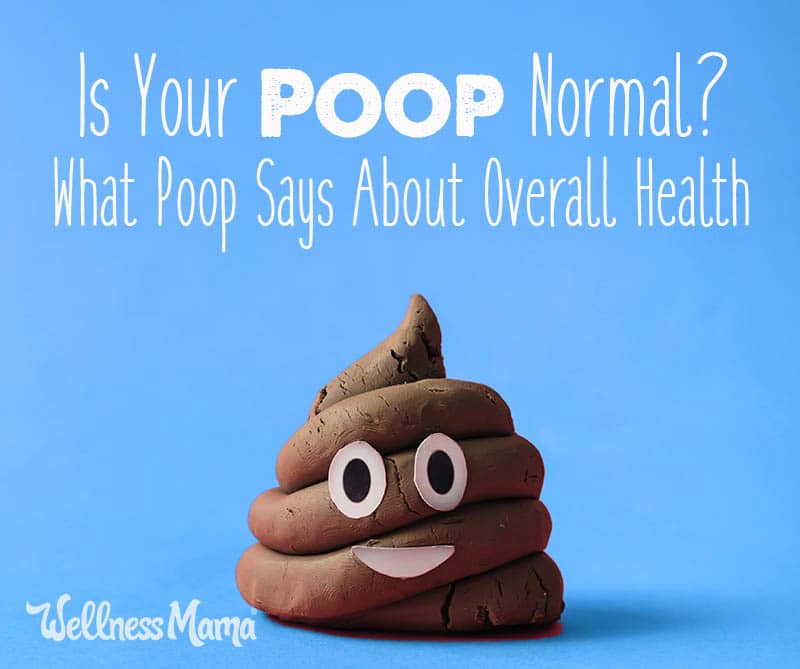All living things eat, so Everyone Poops. – Everyone Poops by Taro Gomi
Who hasn’t read that literary masterpiece to their kids at some point along the way? As parents, we spend the first 3-5 years of our children’s lives handling poop. Every. Single. Day. Poop.
Between diaper changes and snack time, it’s easy to forget about our own poop. And if your house is anything like mine, most bathroom breaks usually involve an unexpected toddler wandering in for the party. But if we actually stop and take a look in the toilet bowl … our poop can be a very real indication of our overall health.
Healthy Poop: Does It Matter?
We all poop. It’s one of the few reminders we get about our health on a (hopefully) daily basis and yet, we don’t pay much attention to it. Not only that, but we also don’t like to talk about it. In our culture, sometimes it’s easier to talk to people about sex than poop.
But the truth is: if you’re not pooping right … something could be terribly wrong inside your body.

For example, research in 2010 suggested that your brain and the good bacteria in your gut communicate directly, influencing your mood, your immune system, and your inflammation.
A 2015 study by researchers in Belgium concluded that “stool consistency is strongly associated” with the healthy of the gut microbiome (meaning the good and bad bacteria living in the intestines).
Next, there’s good short-chain fatty acids (SCFAs) in your colon, which have anti-inflammatory effects and increase insulin sensitivity.
Poop Problems = Poor Digestion
Think of your poop like the annoying chirping sound your smoke detector makes when the battery is low. It’s relentlessly letting you know there’s a problem, and if you don’t do something about it, your house could burn down.
Most of us spend the time and energy to consume healthy, non-GMO, organic food. But are we digesting it well? Are we breaking down and absorbing those nutrients well? The quality of your poop is a direct indication of how well you’re digesting your food.
If you’re poop isn’t healthy, your digestive tract is either moving too slow or too fast, which can lead to an increased risk of developing chronic health conditions like neurological disease, autoimmune disease, and chronic inflammatory conditions. The rate your bowel movements move through the digestive tract also determines how many nutrients and water you absorb from your food.
However if you’re pooping well, it could be an indication your body is relatively healthy and a good sign you’re winning when it comes to health.
Digestive Health Quiz: How Does Your Poop Stack Up?
There’s four critical elements to a perfect poop. If you’ve ever had one, you know how amazing they are. But if you’re not sure, take this quiz and see where you stack up.
1. How Often Do You Poop?
The research suggests you should poop every day. In fact, the range of “normal” is typically 1-3 times a day. Poop is waste and you need to get rid of it every single day to make sure that you’re properly removing toxins and other waste material that’s gotta go.
The bottom line: If you find yourself pooping only a couple pf times a week, or on the other hand, going 5+ times a day, you could be at risk of health problems.
2. Are You Pushing Too Hard?
How easy is it for you to poop? It’s normal in our culture to take our cell phone to the bathroom or read a magazine for a half hour, battling to win the poop fight. But the reality is that a “normal” poop shouldn’t take but a few minutes. This isn’t childbirth … it should be easy! Pushing typically leads to hemorrhoids which are all too common today but not normal.
The bottom line: Normal poops strike a balance between not having to push or strain, but also not having so much urgency you barely can hold it. If you’re spending 10+ minutes on the toilet or running to make it just in time, you’re not having normal bowel movements.
3. Do Your Stools Look Like a Snake?
Did you know there are different classifications or types of poop? Yep, we’re going there.
The most important part of a “normal” poop is the quality, so part of this quiz requires you to look down and see what’s really going on. Thankfully, the folks at the University of Bristol published a study in the Scandinavian Journal of Gastroenterology, gifting us with the Bristol Stool Chart.
Here it is in all its glory:

Start sizing up your recent bowel movements with the knowledge that anything between a 1-3 is considered constipated, while 6s and 7s are considered diarrhea.
The bottom line: A “normal” poop is like #4 on the Bristol Stool Chart: “like a sausage or a snake, smooth and soft.” If your poops aren’t looking like this, they aren’t normal and there’s work to be done.
4. Are You Getting It All Out?
For some people this is a non-issue, but part of a “normal” poop is having what’s so eloquently referred to as a “full evacuation.” Are you getting all your poop out in one swift motion? Do you have to keep coming back to finish the job? Or do you feel like there’s always something left behind lingering and making you feel uncomfortable?
The bottom line: A “normal” poop is a complete poop. If you never quite feel the relief I’m talking about … you’re not having ideal bowel movements.
How to Improve Your Poop
If your poop isn’t normal based on the quiz above, we know your digestive health isn’t what it should be. So here’s a few tips to improve your digestive health and get closer to perfect poops.
1. Eat Real Food
The biggest mistake we see is people that claim to eat healthy, but in reality their diet is full of sugar and low on veggies. Stick to eating real food. It’s one of the most important changes anyone with digestive problems can make.
If you’re someone who’s struggling with constipation or diarrhea, a diet like the Specific Carbohydrate Diet can help heal your gut and get control of your symptoms. The most important thing you can do is listen to what your poop is telling you and continue to make changes to improve the food you’re eating.
2. Consume Probiotics
Our gut has a TON of bacteria, and a healthy gut flora is critical for healthy poop. Consume good “bugs” every single day. Start with fermented foods like sauerkraut, kombucha or water kefir and see how well you tolerate them. A high quality probiotic is one supplement that can also boost the immune system in the gut and improve digestive health.
3. Eat More Fat
Fat has a direct impact on peristalsis, the waves our bodies make to get rid of poop, and can be extremely helpful for people who are constipated. Increase your healthy fats from sources like especially from quality meats, coconut oil, sardines, and foods like olive oil, avocados, and grass-fed butter. Or get healthy fats into your coffee or tea.
4. Drink Enough Water
Drink enough water! This is the most simple and most often missed step to good elimination. Actual amount will vary by person but drink enough water that your urine is lightly colored and doesn’t have a strong smell. Also take into account how much tea or coffee you drink in a day as this could be working against your water count.
5. Use a Squatty Potty
A Squatty Potty is a device you put under your feet to elevate them and change your overall posture when you poop. Simply put, it’s more like squatting (which is how our body was designed to eliminate before modern toilets came along). This post explains the benefits more in-depth, but if you or someone in the family regularly has bathroom issues, I highly suggest putting one in every bathroom. Lower-end models aren’t terribly expensive and the increased comfort level when pooping = priceless.
6. Take a Digestive Tincture
If you (or one of the kids, more likely) is closer to the #1 end of the Bristol Stool Chart (constipated), try making this herbal digestive tincture made with ginger root, fennel, and peppermint. It soothes constipation-related tummy troubles and often gets things moving (very gently).
7. Get Better Sleep
I know, for moms this one seems almost laughable. Still, it’s interesting to know several studies show there’s a possible connection between poor sleep and poop problems, specifically constipation. Even if you’re in the stage of mom life where sleep is scarce, optimize your sleep environment and stay off electronics a few hours before bedtime.
8. Test Your Poop
Yes, I did this. I took a sample of my own poop and mailed it to a lab. It wasn’t the most glorious life moment, but the insight I got into what was really going on in my gut was priceless. If you’re tired of guessing what is going on with your gut or want to know exactly the best steps to enrich your gut microbiome, I can’t recommend this step enough. Thanks to companies like Viome you can do this in the privacy of your home without a doctor (although a doctor certainly might be needed for serious gut issues). See my personalized gut health report and how to set up this test for yourself here.
Are you willing to take a peek at your poop? Is it healthy or need some work? TMI? Share below!


Leave a Reply